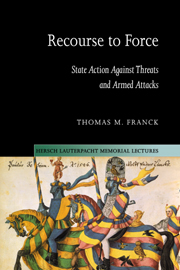102 results
Tribe, Nation, World: Self-Identification in the Evolving International System1
-
- Journal:
- Ethics & International Affairs / Volume 11 / March 1997
- Published online by Cambridge University Press:
- 28 September 2012, pp. 151-169
-
- Article
- Export citation
A continuum theory for one-dimensional self-similar elasticity and applications to wave propagation and diffusion
-
- Journal:
- European Journal of Applied Mathematics / Volume 23 / Issue 6 / December 2012
- Published online by Cambridge University Press:
- 16 August 2012, pp. 709-735
-
- Article
- Export citation
Metallicity Mapping with gri Photometry: The Virgo Overdensity and the Halos of the Galaxy
-
- Journal:
- Proceedings of the International Astronomical Union / Volume 5 / Issue S262 / August 2009
- Published online by Cambridge University Press:
- 13 April 2010, pp. 127-130
- Print publication:
- August 2009
-
- Article
-
- You have access
- Export citation
Preface: International Institutions: Why Constitutionalize?
-
-
- Book:
- Ruling the World?
- Published online:
- 05 June 2012
- Print publication:
- 20 July 2009, pp xi-xiv
-
- Chapter
- Export citation
On Proportionality of Countermeasures in International Law
-
- Journal:
- American Journal of International Law / Volume 102 / Issue 4 / October 2008
- Published online by Cambridge University Press:
- 27 February 2017, pp. 715-767
- Print publication:
- October 2008
-
- Article
- Export citation
12 - Resolving the contradictions of the office
-
-
- Book:
- Secretary or General?
- Published online:
- 06 January 2010
- Print publication:
- 29 January 2007, pp 232-240
-
- Chapter
- Export citation
A Toast to the American Society of International Law on the Occasion of its 200th Anniversary
-
- Journal:
- Proceedings of the ASIL Annual Meeting / Volume 100 / 2006
- Published online by Cambridge University Press:
- 28 February 2017, pp. 458-460
- Print publication:
- 2006
-
- Article
- Export citation
Reflections on Force and Evidence
-
- Journal:
- Proceedings of the ASIL Annual Meeting / Volume 100 / 2006
- Published online by Cambridge University Press:
- 28 February 2017, pp. 51-54
- Print publication:
- 2006
-
- Article
- Export citation
The Power of Legitimacy and the Legitimacy of Power: International Law in an Age of Power Disequilibrium
-
- Journal:
- American Journal of International Law / Volume 100 / Issue 1 / January 2006
- Published online by Cambridge University Press:
- 27 February 2017, pp. 88-106
- Print publication:
- January 2006
-
- Article
- Export citation
Criminals, Combatants, or What? An Examination of the Role of Law in Responding to the Threat of Terror
-
- Journal:
- American Journal of International Law / Volume 98 / Issue 4 / October 2004
- Published online by Cambridge University Press:
- 27 February 2017, pp. 686-688
- Print publication:
- October 2004
-
- Article
- Export citation
The Role of International Law and the UN After Iraq
-
- Journal:
- Proceedings of the ASIL Annual Meeting / Volume 98 / 2004
- Published online by Cambridge University Press:
- 28 February 2017, pp. 266-269
- Print publication:
- 2004
-
- Article
- Export citation
What Happens Now? The United Nations After Iraq
-
- Journal:
- American Journal of International Law / Volume 97 / Issue 3 / July 2003
- Published online by Cambridge University Press:
- 27 February 2017, pp. 607-620
- Print publication:
- July 2003
-
- Article
- Export citation
6 - Interpretation and change in the law of humanitarian intervention
-
-
- Book:
- Humanitarian Intervention
- Published online:
- 27 July 2009
- Print publication:
- 13 February 2003, pp 204-231
-
- Chapter
- Export citation
To the Editor in Chief
-
- Journal:
- American Journal of International Law / Volume 97 / Issue 1 / January 2003
- Published online by Cambridge University Press:
- 16 May 2017, pp. 108-109
- Print publication:
- January 2003
-
- Article
-
- You have access
- Export citation
1 - The United Nations' capacity for adapting to radical changes of circumstance
-
- Book:
- Recourse to Force
- Published online:
- 17 July 2009
- Print publication:
- 24 October 2002, pp 1-19
-
- Chapter
- Export citation

Recourse to Force
- State Action against Threats and Armed Attacks
-
- Published online:
- 17 July 2009
- Print publication:
- 24 October 2002
8 - Countermeasures and self-help
-
- Book:
- Recourse to Force
- Published online:
- 17 July 2009
- Print publication:
- 24 October 2002, pp 109-134
-
- Chapter
- Export citation
10 - What, eat the cabin boy? Uses of force that are illegal but justifiable
-
- Book:
- Recourse to Force
- Published online:
- 17 July 2009
- Print publication:
- 24 October 2002, pp 174-191
-
- Chapter
- Export citation
Frontmatter
-
- Book:
- Recourse to Force
- Published online:
- 17 July 2009
- Print publication:
- 24 October 2002, pp i-viii
-
- Chapter
- Export citation
Index
-
- Book:
- Recourse to Force
- Published online:
- 17 July 2009
- Print publication:
- 24 October 2002, pp 192-205
-
- Chapter
- Export citation



